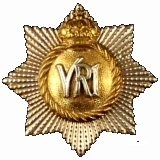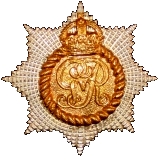
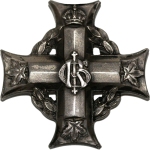
The First World War
Soldiers and Non-Commissioned Officers
of The Royal Canadian Regiment
158582 Acting Sergeant John Joseph Flanagan, M.M.
By: Captain Michael M. O'Leary, The RCR
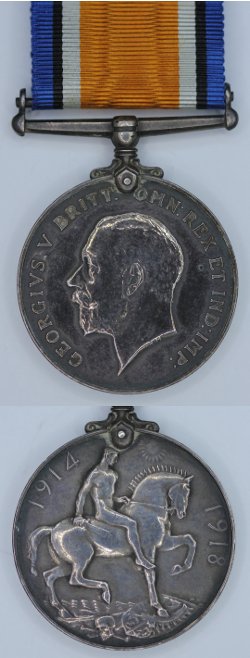
British War Medal awarded to 158582 A/Sgt John Joseph Flanagan, M.M., The R.C.R.
John Joseph Flanagan was born in Brooklyn, NY, USA, on 1 Nov 1886. He was one of many Americans who chose to cross the border and enlist in the Canadian Expeditionary Force before the US entered the First World War.
Flanagan enlisted in the CEF for overseas service with the 97th Canadian Infantry Battalion at Welland, Ontario, on 14 Sep 1915. An ironworker, he was 29 years, 10 months, of age when he committed to serve for the "Duration of War." He was described as 6 feet tall, 164 pounds, with good physical development, a ruddy complexion, hazel eyes and brown hair. A single man, Flanagan identified his next of kin as Mrs Katherine Flanagan of 417 17th St., Brooklyn, NY, USA. Her address would later change to c/o Postmaster, Monticello, NY, USA.
At the time of his attestation, Flanagan claimed prior service in the US Army, having served six years with the 4th, 7th and 13th Infantry. Since he enlisted under the auspices of the 44th Regiment in Welland, he was also recorded as having "prior service" with that unit of the Canadian Militia when he completed his CEF attestation form. A note in Flanagan's service record states that he actually transferred to the 97th Battalion from the 81st battalion on 15 Dec 1915. Flanagan's service number, 158582, is actually from the number block assigned to Military District No. 2 for the recruiting of the 81st Battalion. The 81st Battalion was recruited in the Toronto area, and there is no reason given for why Flanagan had an 81st Battalion service number but ended up with the 97th Battalion.
Despite the mystery regarding the mismatch of his service number and his unit, Flanagan embarked at Halifax on 18 Sep 1916 aboard the troopship S.S. Olympic and sailed for Europe with the 97th Battalion. On arriving in England, the unit disembarked at Liverpool on 25 Sep 1916. That same date, Flanagan was appointed to the rank of Acting Sergeant (with pay).
Flanagan's first experience as an NCO in the CEF was to be short-lived. On 4 Oct 1916 he was reverted to his Permanent Grade for "Conduct contrary to Military Discipline." He would have most likely reverted by the end of the month in any case in order to join a draft for France, few new NCOs went forward to the front line battalions, which usually preferred to promote within their own ranks to make up establishment shortfalls. On 27 Oct 1916, Flanagan was transferred from the 97th Canadian Infantry Battalion on proceeding to The Royal Canadian Regiment. Before departing the 97th Battalion, Flanagan completed a Military Will on 29 Oct 1916 in which he stated "In the event of my death I give the whole of my property and effects to my sister; Mrs Miles Young, 16 Woodbine St, Brooklyn, New York, USA."
John Flanagan, with the draft from the 97th Battalion, landed in France on 3 Nov 1916. Although they had been officially taken on the strength of The RCR on 27 Oct, they remained at the Canadian Base Depot (C.B.D.) until joining The RCR in the field on 22 Nov 1916. The draft from the 97th Battalion which proceeded across the Channel to join The RCR consisted of 199 soldiers.
On 1 Mar 1917, while the Regiment was behind the lines and conducting training in the Bruay area, Flanagan was admitted to No. 10 Canadian Field Hospital. He was diagnosed with "Gas Poisoning" and, on 3 Mar 1917, was admitted to the Corps Rest Station with a diagnosis of pyrexia (fever) of unknown origin (P.U.O.) He would be discharged and return to the Regiment a week later on 10 Mar 1917.
Despite Flanagan's earlier difficulty at keeping promoted rank, it was decided to try advancing him once again. On 15 Apr 1917 he was appointed Acting Lance Corporal and a week later, on 22 May 1917, he was confirmed in the rank of Lance Corporal. Flanagan's promotion was again short-lived, as he once again managed to find himself at odds with the King's Regulations and Orders. On 16 Jul 1917, he was "reprimanded for (1) Absent without leave from 8.30 a.m. until 9 p.m.; (2) Absent from Company Office at 8 a.m.; (3) Absent without leave from 8 a.m. 14 Jul 1917 until 10 a.m. 15 Jul 1917. Forfeits 3 day pay by Royal Warrant. Deprived of Lance Stripe."
Flanagan must have earned his stripe back quickly, but once again it was for naught. On 3 Aug 1917 he was again tried and punished for absence. Again being "Deprived of Acting Lance Stripe; for Absent without leave from 8.30 a.m. 31 Jul 1917 until 12 Noon 3 Aug 1917." As was the usual procedure for cases of A.W.L., he also forfeited 4 days pay by Royal Warrant, the equivalent to the pay he would have earned during the period he was absent. Flanagan's repeated appearances at summary trial and his awarded punishments were still not sufficient to encourage him to meet the expectations placed upon him. On 13 Oct 1917 he was again charged for absence with the result to "forfeit 3 days pay for (1) Absent from Company parade; (2) Absent from 8.15 a.m. parade 12 Oct 1917."
Although he had problems with the requirements of military discipline while the Regiment was out of the lines, there is no evidence that he shirked his duties in the trenches. At the end of October 1917, the Regiment was in the St Jean area and on 30 Oct 1917 was taking over trenches from the 116th Canadian Infantry Battalion at Pommern Castle. The following day, 31 Oct 1917, Flanagan was wounded in action and admitted to No. 3 Casualty Clearing Station on 1 Nov 1917 with gas poisoning.
He began a rearward movement through the medical evacuation system, transferred to No. 18 Ambulance Train on 3 Nov 1917 and admitted to No. 56 General Hospital, Etaples, on 4 Nov 1917. After nine days at 56 General, Flanagan was transferred to No. 6 Convalescent Depot, Etaples, on 13 Nov 1917, and then moved again on 16 Nov 1917 to No. 14 Convalescent Depot at Trouville. After less than a week at Trouville, Flanagan was charged once more and "sentenced to nine days C.B. for Out of Bounds without a pass, contrary to L.R.O. No. 4 dated 25 June 1917."
Flanagan's latest transgressions occurred as he was about to be discharged from hospital and sent back to the front through the reinforcement stream. On 26 Nov 1917, he was discharged and sent to the Base Depot from which he moved to "A" Wing of the Canadian Infantry Base Depot on 29 Nov 1917. Moving quickly through the reinforcement system he arrived at the Canadian Corps Reinforcement Centre on 3 Dec 1917 and rejoined The RCR in the field on 12 Dec 1917.
While John Flanagan was in hospital, his name was apparently steadily rising in the rotation for leave. It was only five days after he returned to the Regiment that he was granted 14 days leave to England starting on 17 Dec 1917, and from which he returned on 8 Jan 1918. Flanagan's luck continued to hold when, almost a year after last losing his Lance Corporal's stripe, he was again appointed to that rank on 14 May 1918.
Six weeks after his promotion Flanagan was back in hospital, a victim of the 1918 flu epidemic. On 30 Jun 1918 he was admitted to No. 8 Canadian Field Ambulance where he would remain until discharged on 6 Jul 1918 to rejoin the Regiment in the field. Flanagan's hospitalization in the summer of 1918 would be his last time away from the Regiment. He was back with his company in time for the battles of Amiens (8-11 Aug 1918) and the opening day (26 Aug 1918) of the Battle of Arras/Scarpe, 1918. In the first of these battles Flanagan would distinguish himself, receiving the Military Medal for bravery on the field of battle. In the second, he would pay the ultimate sacrifice.
On 8 Aug 1918, the first day of the Battle of Amiens, the Regiment's War Diary summarizes the success of the Regiment with the following accomplishments of the lead companies:
- 8.20 a.m. Battalion jumped off. Battalion Headquarters temporarily established in HAMON WOOD.
- 9.10 a.m. Word received from both Front Line Cos. that they were clear of VALLEY and JEAN WOODS. Enemy not putting up very strong fight.
- 10.30 a.m. Word received that LEFT Company had reached Objective. Captured three Field Guns, 6 Machine Guns and seventy prisoners. Casualties - EIGHT.
- 10.45 a.m. Word received that RIGHT Company had reached Objective. Captured 3 Field Guns, eight Machine Guns and ninety prisoners. This Company met with considerable opposition and some stiff fighting ensued. Casualties - TWENTY-SIX.
For his part on this date, John Joseph Flanagan would be awarded the Military Medal. While no citation for Flanagan's Military Medal exists among the CEF documents in the Library and Archives Canada, a copy of the recommendation for his award does survive in regimental Records. From the archives of The RCR, this document reads:
"For Immediate Award"
"158582 Lance Corporal John Joseph Flanagan. - For quick decision and boldness of action during the attack on JEAN WOOD on 8th August 1918. When the advance of his platoon was held up by a concealed Machine Gun in an enemy Observation Post Lance Corporal FLANAGAN led his Platoon forward and outflanked the Post, captured the Gun and personally bayoneted two of the crew. His work throughout the PARVILLERS operations was characterized by the same dash and initiative when he was in command of a "Mopping Up Party."
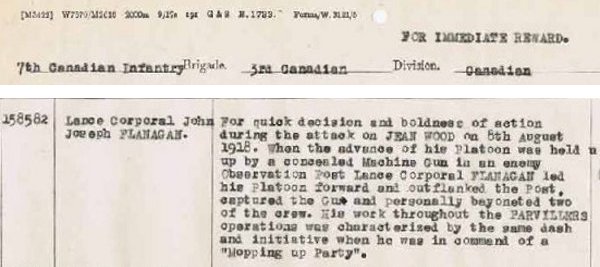
Citation for the award of the Military Medal for S/Sgt John Flanagana, as shown on the form recommending the award. (RCR Archives)
Sadly, Flanagan would not live to enjoy the honour of his award for bravery. On 26 Aug 1918, while the Regiment fought at Moncey, he was reported "Killed in Action," one of the Regiment's 196 officers, N.C.Os. and soldiers killed, wounded and missing that day.
158582 Lance Corporal John Joseph Flanagan is buried in the Vis-en-Artois British Cemetery, Haucort, on the road between Arras and Cambrai. Fourteen Royal Canadians are buried in this cemetery. (Although Flanagan was a Lance Corporal at the time of his death, the highest rank he held during the war was Acting Sergeant, and that is the rank that would appear on his service medals. His Military Medal would bear the rank he held at the time of the award.)
For his war service, Flanagan's medal entitlement, which would have been forwarded to his next of kin, were his Military Medal, plus the British War Medal and the Victory Medal. His service record notes that there was no entitlement to Memorial Cross; he was single and his mother must have predeceased him. A memorial Plaque and Scroll were also issued in 1920 and 1921, respectively. The medals and decoration were sent to Flanagan's nephew: Mr Myles Cornelius Young; c/o Edward A. Clark, esq., J.A. Mahlstedt Lumber & Coal Co., New Rochelle, N.Y., U.S.A.
The award of John Flanagan's Military Medal was published in the London Gazette, issue No. 31173, dated 11 Feb 1919.
Pro Patria
- The O'Leary Collection; Medals of The Royal Canadian Regiment.
- Researching Canadian Soldiers of the First World War
- Researching The Royal Canadian Regiment
- The RCR in the First World War
- Badges of The RCR
- The Senior Subaltern
- The Minute Book (blog)
- Rogue Papers
- Tactical Primers
- The Regimental Library
- Battle Honours
- Perpetuation of the CEF
- A Miscellany
- Quotes
- The Frontenac Times
- Site Map
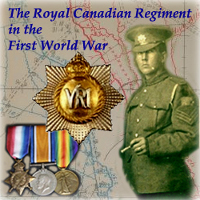
![]() The RCR in the Great War
The RCR in the Great War
![]() War Diary
War Diary
![]() Battle Honours
Battle Honours
![]() Battle Bars and The RCR
Battle Bars and The RCR
![]() The RCR Battle Bar Ledger (pdf)
The RCR Battle Bar Ledger (pdf)
![]() Honours and Awards
Honours and Awards
![]() Roll of Honour
Roll of Honour
![]() Prisoners of War
Prisoners of War
![]() Cemetery List
Cemetery List
![]() Cemetery Map
Cemetery Map
![]() Courts Martial
Courts Martial
![]() Officers
Officers
![]() RSMs of The RCR (1914-1919)
RSMs of The RCR (1914-1919)
![]() NCOs and Soldiers
NCOs and Soldiers
![]() An Officer's Diary (1914-1918)
An Officer's Diary (1914-1918)
![]() Recollections of a Nonagenerian (R. England) (1916-1919)
Recollections of a Nonagenerian (R. England) (1916-1919)
![]() On to Bermuda (1914-15)
On to Bermuda (1914-15)
![]() England and France 1915-1916 (Hayes; 1931)
England and France 1915-1916 (Hayes; 1931)
![]() Overseas with The Royals (1915)
Overseas with The Royals (1915)
![]() Regimental History Pamphlet (1917)
Regimental History Pamphlet (1917)
![]() Amiens (1918)
Amiens (1918)
![]() Cambrai (1918)
Cambrai (1918)
![]() Monchy-le-Preux (1918)
Monchy-le-Preux (1918)
![]() Under-aged Soldiers in The RCR
Under-aged Soldiers in The RCR
![]() Not All Were Volunteers; The RCR and the Military Service Act
Not All Were Volunteers; The RCR and the Military Service Act
![]() Sentenced to Death by Court Martial
Sentenced to Death by Court Martial
![]() The 7th Trench Mortar Battery
The 7th Trench Mortar Battery
![]() A Regimental Goat
A Regimental Goat
![]() Regiment and Family, Bermuda 1914-15
Regiment and Family, Bermuda 1914-15
![]() "March the Guilty Bastard In"
"March the Guilty Bastard In"
![]() Surrendered as Stowaway
Surrendered as Stowaway
![]() Re-Visiting the Great War Roll of Honour for The RCR
Re-Visiting the Great War Roll of Honour for The RCR
![]() Canadian Corps Trench Standing Orders (1916)
Canadian Corps Trench Standing Orders (1916)
